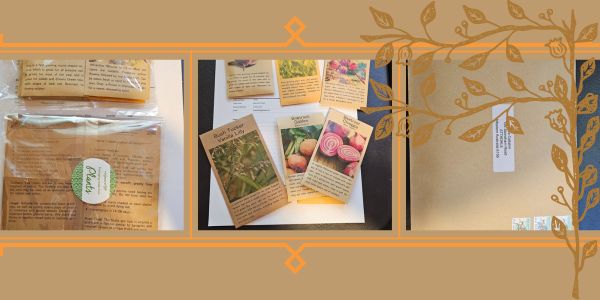Eggplant Caspar
$4.49
Solanum Melongena
- Seed Count 25
- Prolific Plant
- Annual
In stock
Description
Eggplant Caspar is a medium size with smooth ivory-white fruit that has a very mild, sweet mushroom-like flavour. A prolific plant with fruit that ripens early.
An excellent variety for specialty growers and gardeners. Resistant to tobacco mosaic virus.
| Method: Set seedlings | Soil Temp: 24°C - 32°C |
| Cool Mountain: Sep - Jan | Position: Full sun |
| Arid: Oct - Jan | Row Spacing: 70 cm |
| Temperate: Aug - Jan | Harvest: 80 Days |
| Sub Tropical: Aug - Feb | Planting Depth: 5 mm |
| Tropical: Apr - Jul | Plant Height: 1 m |
Photo credit Desmond Talkington
Climate
- They can be grown year-round in warmer regions but are typically planted from late spring to early autumn.
- Frost can be detrimental, so ensure they are planted after the last frost date in cooler regions.
Soil:
- Eggplants prefer loamy, well-draining soils rich in organic matter.
- Soil pH should be between 5.5 and 7.0.
- Conduct a soil test before planting and amend the soil with compost or well-rotted manure to improve nutrient levels.
Sunlight:
- Full sun is essential for healthy growth.
- Aim for at least 6-8 hours of direct sunlight daily.
- Select a site that receives plenty of sun exposure, potentially near a south-facing wall for extra warmth, especially in cooler areas.
Preparing for Planting
Starting Seeds Indoors:
- Start seeds indoors about 8-10 weeks before the last expected frost date.
- Sow seeds in seed-starting trays filled with seed-raising mix.
- Keep the trays in a warm location (about 24-32°C) and ensure they receive ample light
- Consider grow lights if natural light is insufficient.
Transplanting Outdoors:
- Once seedlings are about 10-15 cm tall and all risk of frost has passed, harden them off by gradually exposing them to outdoor conditions.
- Transplant outdoors, spacing plants 70 cm apart in rows about 70 cm apart to allow for adequate growth and air circulation.
Growing Care
Watering:
- Eggplants need consistent moisture to develop properly.
- Water at the base of the plant to minimize leaves getting wet, which can lead to fungal diseases.
- Aim for a total of 2.5-5 cm of water per week, depending on rainfall and temperature. Consider using drip irrigation for efficiency.
Fertilising:
- Fertilise with a balanced fertilizer every 4-6 weeks during the growing season.
- A high potassium fertiliser may be beneficial once fruit development begins, promoting larger and healthier eggplants.
Mulching:
- Apply a layer of organic mulch (straw, grass clippings, or shredded leaves) around the plants to conserve moisture, suppress weeds, and maintain an even soil temperature.
Beneficial Companions for Eggplant
Basil:
- Benefits: Basil enhances the flavour of eggplant and can help repel pests like aphids and spider mites.
- Planting Tip: Sow basil seeds or transplant seedlings around your eggplants to form a beneficial relationship.
Marigold:
- Benefits: Marigolds attract beneficial insects, repel nematodes, and can deter common pests such as aphids and whiteflies.
- Planting Tip: Plant marigolds near the eggplant to create a protective border that keeps pests at bay.
Beans:
- Benefits: Beans can fix nitrogen in the soil, improving nutrient availability for eggplants, while also providing a trellis for climbing varieties.
- Planting Tip: Plant beans near eggplants, but avoid excessive shading, as eggplants require full sun.
Onion and Garlic:
- Benefits: Both onions and garlic can deter pests like aphids and beetles while adding flavour to your garden.
- Planting Tip: Interplant onions or garlic around your eggplants to create a natural pest barrier.
Lettuce and Spinach:
- Benefits: These leafy greens can help shade the soil around eggplants, keeping moisture levels consistent and reducing weed competition.
- Planting Tip: Sow lettuce or spinach seeds between eggplant plants; they’ll mature quickly and can be harvested before the eggplants begin to spread.
Plants to Avoid
Potatoes:
- As another member of the nightshade family, they can attract similar pests and diseases that may affect eggplants.
Tomatoes:
- Similar to potatoes, tomatoes can compete for nutrients and attract shared diseases and pests.
Carrots:
- They can compete for space and nutrients with eggplants, especially in smaller gardens.
Fennel:
- Fennel inhibits the growth of eggplants, due to its allelopathic properties.
Pest and Disease Management
Common Pests:
- Aphids: Small insects that can weaken plants. Control with insecticidal soap or neem oil.
- Spider Mites: Thrive in dry conditions, causing stippling on leaves. Keep foliage moist and control with water sprays or insecticidal soap.
- Whiteflies: Can be removed by introducing beneficial insects like ladybugs or using sticky traps.
Diseases:
- Fungal Diseases (e.g., powdery mildew): Ensure good air circulation and avoid overhead watering. Use fungicides if necessary.
- Root Rot: Avoid overwatering and ensure good drainage to prevent this disease.
Harvesting:
- Harvest eggplants when they are firm, glossy, and the appropriate size (usually 10-20 cm long, depending on the variety).
- Use pruning shears or a sharp knife to cut the fruit from the plant, leaving a short stem attached.
- Regular harvesting can encourage more fruit production.
Postage Charge
Orders under $30 attract a $4.50 shipping charge. Orders $30 and above have free shipping.
Order Times
Seed orders are normally dispatched within three business days. You will receive an email when seeds are mailed out.
Postage Days
Seeds are mailed out Monday to Friday at 1pm. Except for the Friday of long weekends.
Postage Times
WA 2-3 Days: SA,NT 3-5 Days: NSW, ACT, QLD, VIC: 5-7 Days
Carrier
We use Australia Post Letter Postage for the majority of orders
Not only are our seeds packed in recycled paper envelopes, we keep the theme going when we post out website orders. To protect your seeds from moisture and the letter box munchers (snails), we use a very special plastic free material made from plants. They are then put into recycled mailing envelopes. Green all the way 💚🌿






Thanks for my seeds.